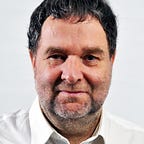To Narrow or Widen the Scope of the Geneva Refugee Convention?
This week, UK’s home secretary, Suella Braverman has proposed (video) to break-open, revise and narrow the interpretation of the Geneva Convention’s refugee definition, because in her opinion, politically seen, too many people are arriving irregularly who do not deserve asylum.
However, with an ever growing number of meanwhile more than 100 million forcibly displaced people in the world, and out of solidarity or from a humanitarian point of view, we actually will much more likely need to widen the definition and step-up our efforts to effectively handle the situation. We will have to stop treating the symptoms and finally start working on the root causes.
Let us be clear, the convention is old, rusty and in my opinion indeed meanwhile outdated. Although touching it, as can be seen by this development, is very dangerous because we will need a new political consensus, which is very far away or out of sight at the moment.
Nevertheless, there is likely no other option than to modernize the convention in order to fundamentally manage the current and future forced migration streams and regain control. Unfortunately, this will be a very difficult and long process.
Still, the actual problem is not that too many people are arriving; we can “easily” cope with the current numbers if there is the political will to do so, as we can clearly see, for example, with the migration wave caused by the war in Ukraine. The real fundamental issue is the way people arrive; it is the irregularity that makes matters complex, causes lengthy legal procedures and, not to forget, endless unnecessary suffering.
Although the refugee definition of the convention fitted well in 1951 to the non-refoulement needs of the group of Second World War victims the convention targeted, the reasons for displacement of people have meanwhile strongly changed.
By now my practical workable definition of a refugee has therefore become: “anyone in acute or foreseeable need of refuge” regardless of their location (IDPs), destination (including transit countries), or the reason for their displacement (including for example climate change). This definition follows a fundamentally different logic than the one currently used. However, the definition does clearly not cover those migrants who are living a dignified life in their home country, but who are seeking for improvement elsewhere.
What we, in my opinion, will have to address is the lack of legal pathways and the fact that there are almost never any open borders (with the exception of, for example, Ukraine). This is why my definition does not contain any requirement to first cross a border (often almost impossible or only with the help of criminals).
The new definition allows and will stimulate us to become proactive and tackle the roots of involuntary migration. If we do so, we can simultaneously organize and optimize regular resettlement solutions. This way avoiding as much as possible that refugees land somewhere where they do not find any connection or realistic adaptation potential in a society. Something that, in case of a mismatch, is currently extremely expensive and destabilizing for the host country.
Humanity’s target has to be to (re)establish dignity and offer reinclusion to everyone involuntarily displaced in the world. If we manage this (even partially), we will grow together instead of further apart.
